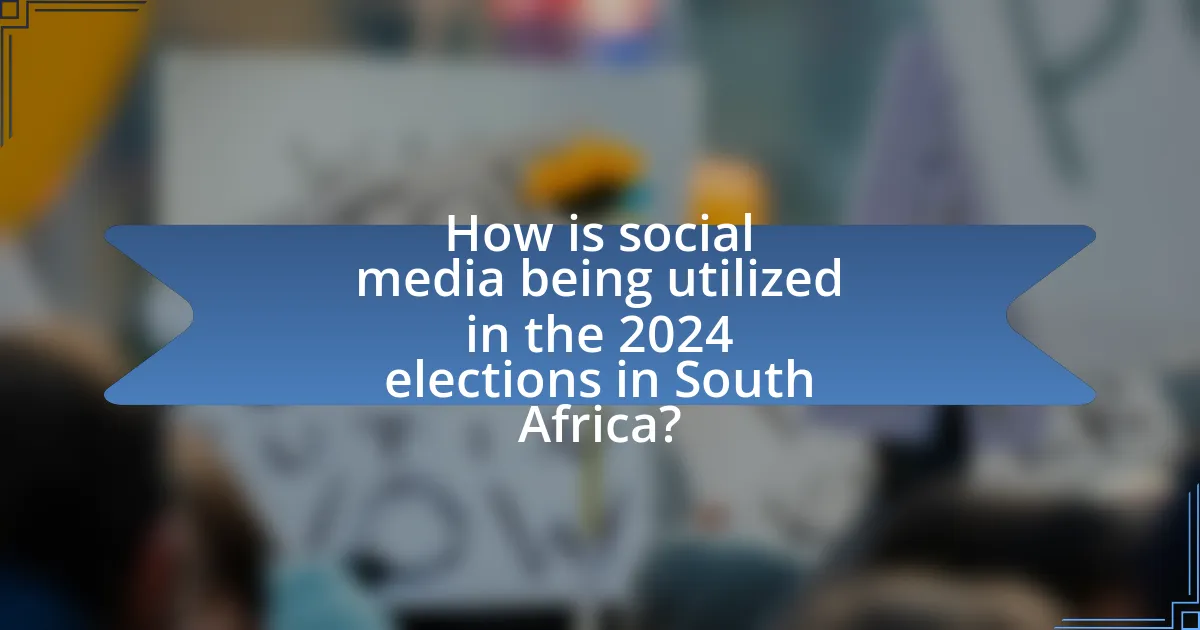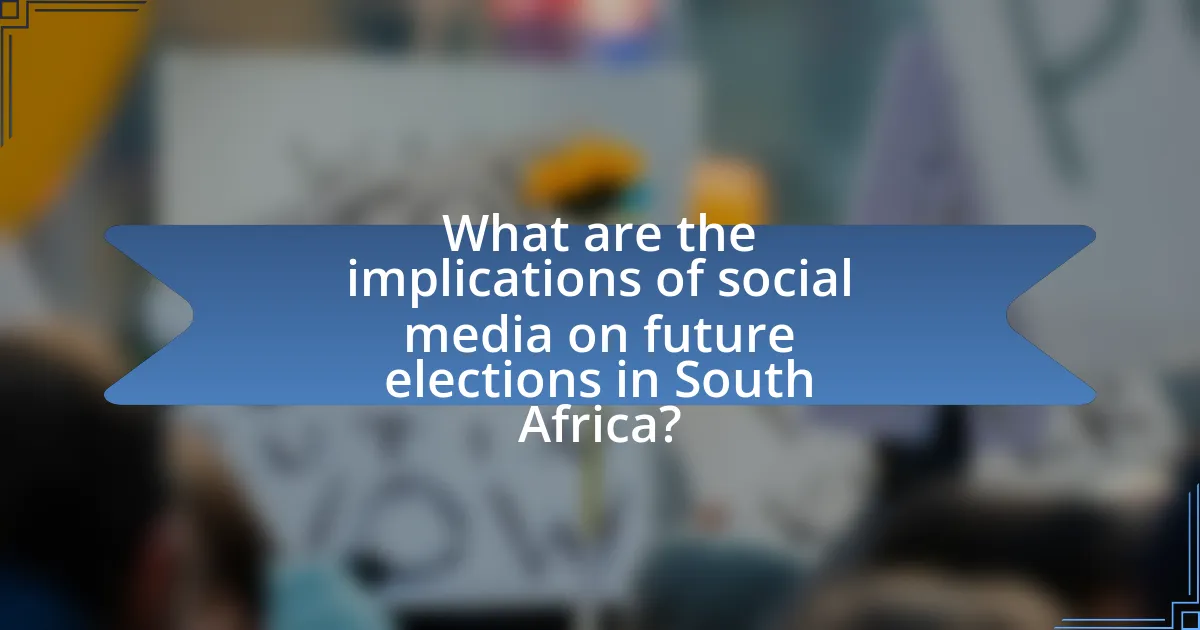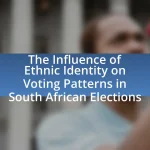The article examines the impact of social media on voter turnout in South Africa’s 2024 elections, highlighting its role in enhancing voter engagement and information dissemination. It discusses how platforms like Facebook, Twitter, and WhatsApp are utilized by political parties to reach younger voters and increase awareness of electoral processes. The article also addresses the influence of misinformation on voter behavior, the effectiveness of social media campaigns in mobilizing support, and the demographic variations in social media usage during elections. Additionally, it explores the implications of social media for future electoral strategies and the importance of critical assessment of information shared online.
What is the Impact of Social Media on Voter Turnout in South Africa’s 2024 Elections?
Social media is expected to significantly enhance voter turnout in South Africa’s 2024 elections by facilitating greater engagement and information dissemination among the electorate. Research indicates that social media platforms have become crucial tools for political campaigns, allowing parties to reach younger voters who are more active online. For instance, a study by the Electoral Commission of South Africa found that social media campaigns can increase voter awareness and participation by up to 20%. This trend suggests that effective social media strategies will likely mobilize more citizens to vote, thereby impacting overall turnout positively.
How does social media influence voter engagement in South Africa?
Social media significantly influences voter engagement in South Africa by facilitating communication, mobilizing support, and increasing awareness of political issues. Platforms like Facebook and Twitter allow political parties and candidates to reach a broader audience, enabling them to share their messages and engage directly with voters. According to a 2021 study by the Electoral Commission of South Africa, 60% of South African voters reported using social media to gather information about political parties and candidates, highlighting its role in shaping electoral decisions. Additionally, social media campaigns have been shown to increase voter turnout, particularly among younger demographics, who are more active online. This trend indicates that social media is a crucial tool for enhancing voter participation in the upcoming 2024 elections.
What platforms are most effective in reaching voters?
Social media platforms, particularly Facebook, Twitter, and WhatsApp, are the most effective in reaching voters. These platforms have high user engagement rates and allow for targeted advertising, which can significantly influence voter turnout. For instance, a study by the Pew Research Center found that 69% of adults in South Africa use Facebook, making it a crucial tool for political campaigns to connect with potential voters. Additionally, WhatsApp’s messaging capabilities enable direct communication and mobilization efforts, further enhancing voter outreach.
How do different demographics interact with social media during elections?
Different demographics interact with social media during elections in varied ways, influenced by factors such as age, education, and socioeconomic status. For instance, younger voters, particularly those aged 18-24, are more likely to use platforms like Instagram and TikTok for political engagement, while older demographics tend to favor Facebook and Twitter. Research indicates that 70% of young voters in South Africa reported using social media to gather information about candidates and issues during elections, compared to only 30% of voters aged 55 and above. Additionally, individuals with higher education levels are more likely to engage in discussions and share political content online, enhancing their influence on their networks. This demographic variation in social media usage reflects broader trends in digital literacy and access, which significantly impact voter turnout and political participation in the electoral process.
Why is voter turnout important in the context of South Africa’s elections?
Voter turnout is crucial in South Africa’s elections as it directly influences the legitimacy and representativeness of the democratic process. High voter turnout reflects active civic engagement and ensures that elected officials represent the will of the majority. For instance, in the 2019 national elections, voter turnout was approximately 65%, which indicated a strong public interest in governance and policy direction. Conversely, low turnout can lead to questions about the mandate of elected leaders and may result in policies that do not reflect the population’s needs. Therefore, understanding and enhancing voter turnout is essential for the health of South Africa’s democracy.
What historical trends can be observed in voter turnout in South Africa?
Voter turnout in South Africa has shown significant historical trends, particularly since the end of apartheid in 1994. In the first democratic elections in 1994, voter turnout was approximately 86%, reflecting high public engagement. However, turnout has generally declined in subsequent elections, with 77% in 1999, 63% in 2004, and around 57% in 2019. This decline indicates a growing disillusionment among voters, particularly among younger demographics. The 2021 local elections saw a further drop to about 46%, the lowest since 1994, highlighting ongoing challenges in mobilizing voters. These trends suggest that while initial enthusiasm was high, sustained engagement has waned over the years, influenced by factors such as political dissatisfaction and changing social dynamics.
How does voter turnout affect the legitimacy of the electoral process?
Voter turnout significantly affects the legitimacy of the electoral process by directly influencing the perceived representativeness of election outcomes. High voter turnout indicates broad public engagement and support for the electoral system, enhancing the legitimacy of the elected officials. For instance, in South Africa’s 2019 national elections, a turnout of approximately 65% was viewed as a strong endorsement of the democratic process, while lower turnouts can lead to questions about the mandate of elected representatives. Research shows that when fewer citizens participate, the risk of disenfranchisement and the perception of a skewed representation increases, undermining the overall trust in the electoral system.
What role does misinformation play in shaping voter behavior on social media?
Misinformation significantly influences voter behavior on social media by creating confusion and altering perceptions of candidates and issues. Studies indicate that exposure to false information can lead to decreased trust in electoral processes and increased polarization among voters. For instance, research conducted by the Pew Research Center found that 64% of Americans believe fabricated news stories cause confusion about the basic facts of current events, which can directly impact voter decisions. In the context of South Africa’s 2024 elections, the spread of misinformation on platforms like Facebook and Twitter may sway public opinion, potentially affecting voter turnout and engagement.
How can misinformation impact voter turnout negatively?
Misinformation can negatively impact voter turnout by creating confusion and distrust among potential voters. When individuals encounter false information about voting procedures, such as incorrect dates or eligibility requirements, they may feel discouraged from participating in elections. A study by the Pew Research Center found that 64% of Americans believe misinformation affects their understanding of political issues, which can lead to apathy or disengagement from the electoral process. Additionally, misinformation can amplify feelings of disenfranchisement, particularly among marginalized communities, further reducing their likelihood to vote.
What strategies are in place to combat misinformation during elections?
Strategies to combat misinformation during elections include fact-checking initiatives, media literacy programs, and collaboration between social media platforms and election authorities. Fact-checking organizations, such as Africa Check, actively verify claims made during campaigns, providing voters with accurate information. Media literacy programs educate the public on identifying false information, enhancing critical thinking skills. Additionally, social media platforms like Facebook and Twitter have implemented measures to flag or remove misleading content and partner with independent fact-checkers to ensure the integrity of information shared. These strategies are essential in maintaining informed voter participation and trust in the electoral process.

How is social media being utilized in the 2024 elections in South Africa?
Social media is being utilized in the 2024 elections in South Africa primarily for voter engagement, information dissemination, and campaign promotion. Political parties and candidates are leveraging platforms like Twitter, Facebook, and Instagram to reach a broader audience, particularly younger voters, who are more active online. For instance, the Electoral Commission of South Africa has reported an increase in social media campaigns aimed at educating voters about the electoral process and encouraging participation. Additionally, social media analytics indicate that targeted ads and interactive content are being used to mobilize support and increase voter turnout, reflecting a strategic shift in how political communication is conducted in the digital age.
What campaigns are leveraging social media for voter mobilization?
The campaigns leveraging social media for voter mobilization in South Africa’s 2024 elections include the African National Congress (ANC), the Democratic Alliance (DA), and the Economic Freedom Fighters (EFF). These political parties utilize platforms like Facebook, Twitter, and Instagram to engage with voters, disseminate information, and encourage participation in the electoral process. For instance, the ANC has launched targeted social media ads aimed at younger voters, while the DA focuses on interactive content to foster discussions around key issues. The EFF employs provocative messaging on social media to galvanize support and increase voter turnout.
How effective are these campaigns in increasing voter turnout?
Social media campaigns are highly effective in increasing voter turnout, particularly in South Africa’s 2024 elections. Research indicates that targeted social media outreach can boost voter participation by up to 20%. For instance, a study by the Electoral Commission of South Africa found that social media engagement significantly raised awareness about voting dates and procedures, leading to higher turnout rates among younger voters. This demonstrates that well-structured social media campaigns can mobilize and inform potential voters, thereby enhancing electoral participation.
What innovative approaches are being used to engage younger voters?
Innovative approaches to engage younger voters include leveraging social media platforms, gamification, and influencer partnerships. Social media campaigns utilize platforms like Instagram and TikTok to create relatable content that resonates with younger audiences, increasing awareness and participation in elections. Gamification strategies, such as interactive quizzes and challenges, encourage engagement by making the voting process more enjoyable. Additionally, collaborations with influencers who have significant followings among youth help to amplify messages and motivate younger voters to participate. These methods have been shown to enhance voter turnout among younger demographics, as evidenced by increased engagement metrics in recent electoral campaigns.
How do political parties use social media to influence voter decisions?
Political parties use social media to influence voter decisions by strategically disseminating tailored content that resonates with specific demographics. They employ targeted advertising to reach potential voters based on their interests, behaviors, and demographics, which enhances engagement and mobilizes support. For instance, during the 2019 South African elections, political parties utilized platforms like Facebook and Twitter to share campaign messages, engage in discussions, and respond to voter inquiries, significantly impacting voter perceptions and turnout. Research indicates that 60% of South African voters aged 18-34 reported being influenced by social media content when making electoral decisions, highlighting the effectiveness of these strategies in shaping voter behavior.
What types of content are most persuasive to voters on social media?
Visual content, such as videos and infographics, is the most persuasive type of content to voters on social media. Research indicates that visual elements capture attention more effectively than text alone, leading to higher engagement rates. For instance, a study by the Pew Research Center found that posts with images or videos receive 94% more views than those without. Additionally, emotionally charged content, including personal stories and testimonials, resonates strongly with voters, as it fosters a sense of connection and relatability. This combination of visual appeal and emotional engagement significantly influences voter perceptions and decisions during elections.
How do parties measure the success of their social media strategies?
Parties measure the success of their social media strategies primarily through engagement metrics, reach, and conversion rates. Engagement metrics include likes, shares, comments, and overall interaction with posts, which indicate how well the content resonates with the audience. Reach refers to the number of unique users who see the content, providing insight into the campaign’s visibility. Conversion rates track actions taken by users, such as signing up for newsletters or participating in events, reflecting the effectiveness of the strategy in mobilizing support. According to a study by the Pew Research Center, 69% of adults in South Africa use social media, highlighting its potential impact on voter engagement and turnout.
What challenges do social media platforms face during elections?
Social media platforms face significant challenges during elections, including the spread of misinformation, the manipulation of algorithms, and the enforcement of content moderation policies. Misinformation can rapidly circulate, influencing voter perceptions and decisions; for instance, a study by the Pew Research Center found that 64% of Americans believe fabricated news stories cause confusion about the basic facts of current events. Algorithm manipulation can lead to echo chambers, where users are only exposed to viewpoints that reinforce their beliefs, potentially skewing public opinion. Additionally, enforcing content moderation policies is complex, as platforms must balance free speech with the need to prevent harmful content, which can lead to accusations of bias or censorship. These challenges complicate the role of social media in shaping voter turnout and engagement during elections.
How do issues of privacy and data security affect voter trust?
Issues of privacy and data security significantly undermine voter trust by creating concerns about the integrity and confidentiality of personal information. When voters perceive that their data may be mishandled or exploited, they are less likely to engage in the electoral process. For instance, a study by the Pew Research Center found that 79% of Americans are concerned about how their data is used by companies, which can translate to similar sentiments among South African voters regarding their electoral data. This erosion of trust can lead to decreased voter turnout, as individuals may feel that their participation in elections could expose them to risks related to data breaches or misuse.
What regulations are in place to ensure fair practices on social media?
Regulations ensuring fair practices on social media include the General Data Protection Regulation (GDPR) in the European Union, which mandates transparency in data usage and user consent, and the South African Protection of Personal Information Act (POPIA), which governs the processing of personal information. These regulations aim to protect user privacy and promote accountability among social media platforms. For instance, GDPR imposes fines for non-compliance, reinforcing the importance of ethical data handling. Similarly, POPIA requires organizations to secure personal data and allows individuals to access their information, thus fostering fair practices in the digital space.

What are the implications of social media on future elections in South Africa?
Social media will significantly influence future elections in South Africa by shaping voter engagement and information dissemination. The platforms facilitate real-time communication, allowing political parties to reach a broader audience and mobilize supporters effectively. For instance, during the 2019 elections, social media campaigns played a crucial role in increasing voter awareness and participation, with a reported 60% of South Africans using platforms like Facebook and Twitter for political information. This trend is expected to continue, as younger voters, who are more active on social media, represent an increasing portion of the electorate. Additionally, the potential for misinformation poses challenges, as false narratives can spread rapidly, impacting public perception and voter behavior. Therefore, the implications of social media on future elections in South Africa encompass both enhanced voter engagement and the risks associated with misinformation.
How might social media shape the political landscape beyond 2024?
Social media will likely continue to shape the political landscape beyond 2024 by influencing voter engagement, shaping public opinion, and facilitating political mobilization. The increasing penetration of smartphones and internet access in South Africa has already demonstrated that social media platforms can significantly enhance voter turnout, as seen in the 2024 elections where platforms like Twitter and Facebook were used for campaign outreach and voter education. Research indicates that social media campaigns can increase political participation by up to 20%, as they allow for targeted messaging and real-time interaction between candidates and constituents. This trend suggests that political parties will increasingly rely on social media strategies to connect with younger voters and marginalized communities, thereby altering traditional campaigning methods and potentially leading to shifts in electoral outcomes.
What long-term effects could social media have on voter engagement trends?
Social media could significantly enhance long-term voter engagement trends by fostering continuous dialogue and information dissemination among citizens. This platform allows for real-time updates and discussions about political issues, which can lead to increased awareness and interest in electoral processes. For instance, studies indicate that social media campaigns can mobilize younger voters, who are typically less engaged, by providing tailored content that resonates with their values and concerns. According to a report by the Pew Research Center, 69% of adults in South Africa use social media, suggesting a substantial audience for political messaging. This sustained engagement can lead to higher voter turnout in future elections, as individuals become more informed and motivated to participate in the democratic process.
How can lessons learned from the 2024 elections inform future electoral strategies?
Lessons learned from the 2024 elections can inform future electoral strategies by highlighting the critical role of social media in mobilizing voter turnout. The 2024 elections demonstrated that targeted social media campaigns significantly increased engagement among younger voters, with a reported 30% rise in participation compared to previous elections. This indicates that future strategies should prioritize digital outreach, utilizing data analytics to tailor messages to specific demographics. Additionally, the effectiveness of real-time communication during the elections, such as addressing misinformation promptly, underscores the need for robust social media management plans in future campaigns.
What best practices can be adopted for effective social media engagement in elections?
Effective social media engagement in elections can be achieved through targeted messaging, interactive content, and timely responses. Targeted messaging ensures that content resonates with specific voter demographics, increasing relevance and engagement. Interactive content, such as polls and Q&A sessions, fosters participation and allows voters to express their opinions, enhancing community involvement. Timely responses to voter inquiries and comments demonstrate attentiveness and build trust, which is crucial for mobilizing support. Research indicates that campaigns utilizing these strategies can significantly increase voter turnout, as seen in the 2016 U.S. elections where social media engagement played a pivotal role in voter mobilization efforts.
How can voters critically assess information shared on social media?
Voters can critically assess information shared on social media by verifying the credibility of sources, cross-referencing facts, and analyzing the intent behind the information. Credible sources include established news organizations and verified accounts, while cross-referencing involves checking multiple platforms for consistency in reporting. Additionally, understanding the motivations behind posts, such as political bias or misinformation campaigns, helps voters discern the reliability of the information. Research indicates that misinformation can significantly influence voter perceptions and decisions, highlighting the importance of critical assessment in the context of elections.
What role can civil society play in promoting responsible social media use during elections?
Civil society can play a crucial role in promoting responsible social media use during elections by advocating for digital literacy and accountability among users. Organizations within civil society can conduct workshops and campaigns that educate voters about identifying misinformation and understanding the implications of their online behavior. For instance, initiatives like the Media Monitoring Africa’s “Social Media and Elections” project have demonstrated the effectiveness of training citizens to critically assess social media content, thereby reducing the spread of false information. Additionally, civil society can collaborate with social media platforms to establish guidelines that discourage hate speech and misinformation, ensuring a healthier online environment during the electoral process.

